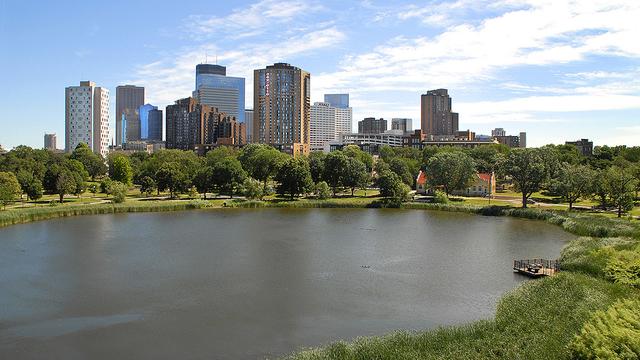Photo: Meet Minneapolis
A large grant to the University of Minnesota and other partners will support ongoing research by the Humphrey School of Public Affairs into "green gentrification" and the intersection of urban nature and racial injustice.
Humphrey School Assistant Professor Bonnie Keeler is a co-principal investigator of the new Minneapolis-St. Paul Metropolitan Area Urban Long Term Ecological Research (LTER) program, announced this week. The $7.1 million project, funded by the National Science Foundation, will launch with an initial nine research projects and initiatives.
The University of Minnesota, the University of St. Thomas, the U.S. Forest Service, The Nature Conservancy, and Water Bar are partners in the LTER, to study how stressors such as climate change, invasive pests, and pollutants affect the ecological structure and functioning of urban nature, including pollinators, the urban forest, urban watersheds, and lakes and streams.
Researchers will also study how urban residents interact with urban nature, and how the benefits and burdens of urban nature are not experienced equally by all residents. Trends in American cities suggest that investments in urban nature may have contributed to the persistent and wide racial wealth gap.
The goal is for researchers to better understand urban nature, as well as the policies and practices that are currently in place, to improve environmental outcomes for all residents.
CREATE Initiative to expand
Keeler has been studying these questions for several years through the CREATE Initiative, which she directs along with Kate Derickson, associate professor of geography at the University of Minnesota.
CREATE is an ongoing research effort aimed at addressing root causes that drive unequal distribution of environmental amenities and associated benefits. The NSF grant will support the CREATE Initiative for six more years, and allow it to expand beyond Minneapolis to include the entire Twin Cities metro area.
“It's super exciting. Projects like CREATE have helped make the case for focused long-term study of social-environmental systems in the Twin Cities,” Keeler says, noting that while the metro area is known for great parks and an urban environment filled with lakes, rivers, and abundant public spaces, it also has some of the worst racial disparities in the United States.
The legacy of exclusionary policies such as racial covenants and redlining has contributed to segregation and unequal access to environmental benefits in the area.
“We need to investigate how investments in urban nature affect wealth distribution in highly segregated cities,” she says. “Will new parks, riverfront redevelopments, pollinator gardens, and an expanded urban forest help or hinder efforts to reduce racial disparities in access to nature and associated benefits? Or will these investments only lead to green gentrification and displacement, reproducing the same problematic dynamics that we seek to disrupt? These are the kinds of questions this project will allow us to address.”
Another important aspect of the LTER program is its focus on engaging communities in its research projects, which Keeler describes as a “notable shift from the traditional model of academic scholarship.”
Project leaders say they will be “engaging with, listening to, and learning from Black, Indigenous and people of color to acknowledge and address systematic discriminatory practices in urban ecosystem science, policy, and management.”
In addition to her leadership over this research effort, Keeler will serve on the executive team overseeing the entire project.
More about the project
Among the research, education, and engagement efforts outlined in the LTER project:
- A team led by Leslie Brandt, U.S. Forest Service, and Jeannine Cavender-Bares, University of Minnesota: Examining how urban forests can become more resilient to withstand stressors, such as climate change and pests.
- A team led by Susannah Lerman, U.S. Forest Service, and Adam Kay, University of St. Thomas: Testing the effectiveness of the new state-wide “Bee Lawn” program for transforming the Twin Cities metro into a refuge for pollinators.
- A team led by Holly Menninger, Bell Museum: Working with teachers to develop resources for using urban nature in their own school yards and neighborhoods to engage with students about science in ways that meet state science standards.
Learn more about all of the Minneapolis-St. Paul Metropolitan Area Urban LTER program projects and initiatives.
Additionally, scientists and others from the University of Minnesota’s College of Biological Sciences; College of Science & Engineering; College of Food, Agricultural, and Natural Resource Sciences; College of Liberal Arts; Institute on the Environment; Bell Museum; and Saint Anthony Falls Laboratory will conduct research, education, and community engagement efforts across the Twin Cities.



